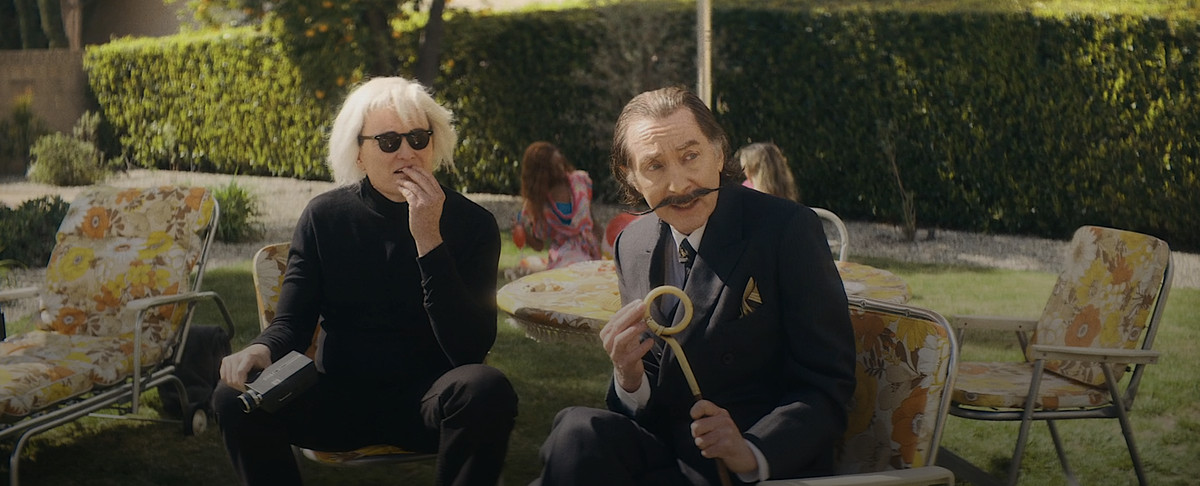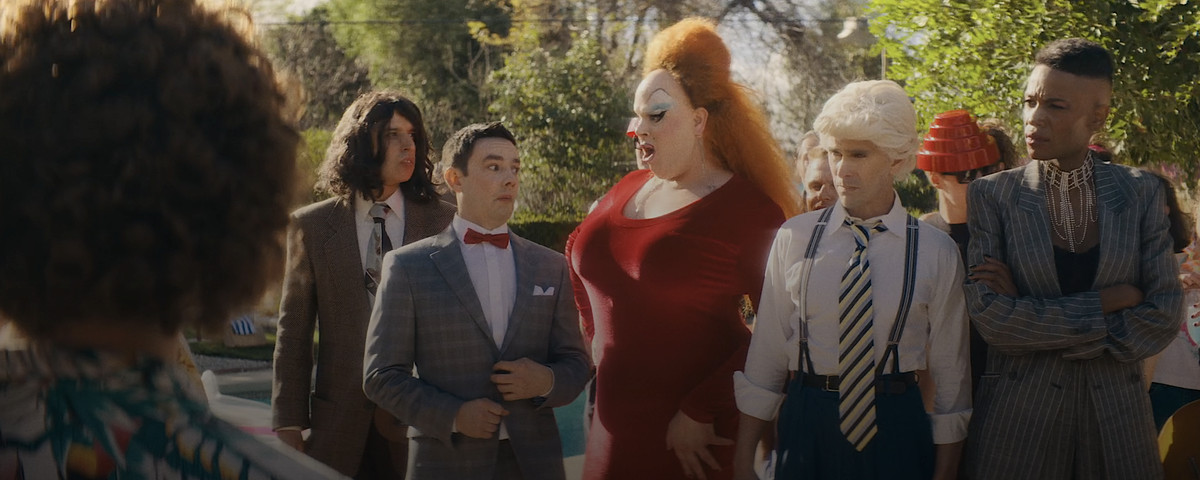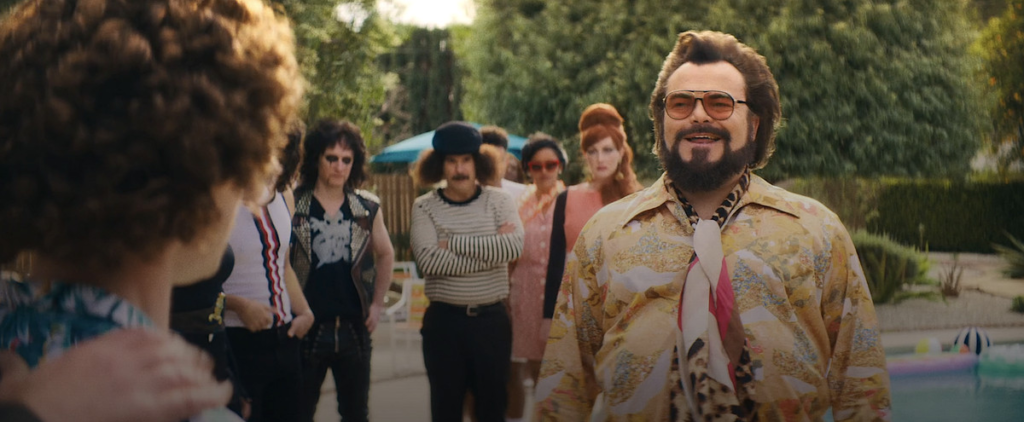Imagine you were famous in the 1980s, and instantly recognizable for one signature look: Hawaiian shirt, a bushy mustache, and a big cap of tightly curled hair. Now imagine it’s the present, and you’re watching someone else famous dress up in that outfit for a movie that re-creates every fashion choice you made 40 years ago. That’s something “Weird Al” Yankovic faced with Weird: The Al Yankovic Story, the Roku Channel’s faux biopic about his life and work, expanding on a Funny or Die joke trailer, and starring the Harry Potter movies’ Daniel Radcliffe in the title role. How do you live that down?
If you’re actually Weird Al, you don’t sweat it, because your ’80s look never really went away. “It’s a look I’m still familiar with,” Yankovic told Polygon in an interview ahead of Weird’s release. “Because it’s the look that, like, a thousand people dress up as for Halloween. I see it on my Twitter feed every year, little kids still dressing up like ’80s Al. So that’s something I am continually bombarded with.”
Still, he says it was “very odd to revisit this point in my career,” even though he knew it was coming — he and director Eric Appel co-wrote the script together, so there weren’t a lot of surprises in how he was portrayed. He just found it strange “to see some of these moments re-created, even though some of them are obviously very heightened.”
The biggest oddity for him was revisiting his earliest recorded songs and reproducing them as studio numbers, instead of amateur performances in bathrooms or radio stations. “I mean, to go back in the studio and record ‘Another One Rides the Bus’ — that was never recorded in a studio,” Yankovic says. “The master recording of that was from a live performance on the Dr. Demento radio show, so I’d never actually gone into a studio to record that until I did it for this movie.”
Polygon recently sat down with Yankovic, Daniel Radcliffe, and director Eric Appel to talk about the movie — how it was conceived, what went into the pool scene featuring Jack Black, Conan O’Brien, Emo Philips, and Paul F. Tompkins in cameos as familiar celebrities, and how much they’re hoping Madonna can take a joke.
This interview has been edited for concision and clarity.
Image: The Roku Channel
Polygon: How do you personally approach the question of how to make comedy funny?
Eric Appel: I think it’s instinctual. I don’t really think much about it. I think in the case of this movie, to make this comedy funny, [we had] to make it dramatic: Lean into the drama, let the comedy come from the absurdity of something strange being played completely straight.
“Weird Al” Yankovic: I’ll co-sign that I don’t want to dissect the frog. I can’t define what makes comedy funny. But in this particular case, like Eric said, the comedy is still coming from surprise, but it’s rooted in doing something very grounded and real, and having it take certain directions that you wouldn’t expect.
Daniel Radcliffe: And I definitely think I’m the least qualified out of the three here to make a strong opinion on why something is funny. Comedy is what I was most interested in when I was growing up, on my own time. That was most of what I was watching. And I think I’ve just been really lucky to get to work with a bunch of really, really funny people in different ways, and just try and learn from them.
Appel: I’ve described this film as feeling like a Weird Al song: You think you’re gonna hear the song, but the words are different. We wanted to feel close to one of these award-season movies, a dramatic biopic. But the words are different.
Yankovic: That’s a good comparison. Because that’s the tack I take for a lot of my parodies — we try to re-create it as closely as possible, and emulate the original production, so if you weren’t paying attention, you might think it was the actual song. Then it takes a sharp left turn, and you’re going, Wait a minute. That’s not right.
What was the creative appeal in sticking so closely to the patterns of real biopics?
Appel: I just thought it would be a funny idea at first. But I think the approach to this one in particular — I wanted to do something a little more unexpected. I didn’t just want to do a straight, down-the-middle parody of a specific biopic. I wanted to take the entire genre — and not even just musical biopics, I wanted to draw from fictional biopics like Forrest Gump and Boogie Nights, then obviously all the rock biopics. They all have these similar story beats: You know [the subject] is always gonna hit rock bottom at some point, then rise from the ashes. The appeal was to play all those beats, but to do them in really surprising, unexpected ways. So you’re not just watching a parody of a biopic, you’re just watching a bizarre biopic.

What went into the decision to build it so much around parental disapproval, and Weird Al’s relationship with Madonna?
Yankovic: Eric and I had many discussions about which tropes we would be trying to hit as beats in this movie. And the parent thing just kept getting repeated over and over in all these biopics. So even though my own parents in actual real life were extremely supportive and very, very sweet, we needed to have a parental character that just did not approve of their weird son. So that became the main dramatic beat of the movie — I’m trying to gain my father’s approval. We needed that kind of dramatic tension to carry through, so we took a few liberties here and there.
Appel: Another big part of the process was making things feel really unexpected in the back half of the movie, but loading them with payoffs from things early in the movie. Like when you start a sequence, you’re like, What is happening? And by the end of it, you’re like, Well, that had to happen. Crafting all of that into the story was challenging and really fun, and ended up being very rewarding at the end of the day.
Radcliffe: I think this film is sneakily well-plotted. Pablo Escobar is seeded very, very early on in the film. There are tiny moments like that with everything in the movie. It’s really well-written.
Yankovic: I’ll tell you a secret — one of the reasons Eric wanted to put those seeds in is so the studio wouldn’t make us cut out the whole Colombia sequence. He said, “That’s the first thing they’re gonna want to lose. They’ll take out that whole section. So we’ll put it through the whole movie, so they can’t take it out.”
Appel: So it’d still be unexpected, but they’d be like, “Oh, yeah, OK, they were building to that.”
Was there ever any question about having Daniel sing Al’s songs, instead of lip-syncing?
Yankovic: That was something we agonized over. Eric and I both felt a tinge of regret once we heard Daniel sing. I mean, we knew he was a great singer — he’s a Broadway star. But [on the set], he would sing along with the pre-recorded tracks, and Eric and I would look at each other and go, “Did we make a mistake here?” The trouble always was that it’s a biopic thing for people to be lip-syncing, because it’s good. It was famously done by Rami Malek in Bohemian Rhapsody, and we just thought, “That’s kind of the joke here. That’s part of the joke.” But man, Daniel would have killed it either way.
Radcliffe: That’s really, really kind. But I think it’s very funny — I get a kick every time I start “My Bologna,” and my mouth opens, and I see your voice coming out of it. I love it.
Appel: And people still ask, “Is that Daniel? Is he singing?”
Radcliffe: I think it’s so obviously Al. But I have been asked by a few people, “Is that you? I thought it was!” And I’m like, “No!”
Yankovic: What I’ve seen online from people reacting to the trailers is a lot of “That is totally auto-tuned!” No, actually, just lip-sync.
I noticed even The New York Times couldn’t get anybody from Madonna’s camp to comment on her role as the film’s biggest villain. Have you heard anything about her feedback or response to that character?
Yankovic: Nope! [laughs]
Appel: Nothing at all! I mean, I hope she likes it. I think she will. It’s pretty funny.
Radcliffe: It’s not like we made a really serious movie in which she is this character. Everybody in this film is insane. And I do think Evan [Rachel Wood] does such an incredible job as Madonna. I feel like Madonna might watch it and just be like, Yeah, cool. That girl can play me. That’s great.
At what point in the movie did you decide Al was going to play a role, and why Tony Scotti?
Yankovic: That was sort of the role I played in the original Funny or Die piece. I can’t remember why.
Appel: I think the most fun thing about it is that Al gets to play a character who’s mean to the movie version of himself.
Yankovic: It’s a very self-aware thing, because in the movie, there are actually jokes about it being me playing Tony Scotti. It’s also sort of an oblique reference to like — wasn’t Mike Myers in Bohemian Rhapsody, playing a very self-aware version of himself?
Appel: It was a little confusing on set, directing Al, and not knowing — I’m like, “I have a note for Al,” and two people look up. Our editor started referring to them as Al Junior and Al Senior. “You want to see different takes of Al Senior here?”

Image: The Roku Channel
What went into assembling the Boogie Nights parody scene at Dr. Demento’s house? How did you decide who would be there, and who they’d play?
Yankovic: Well, we had the script, so we knew what the characters were going to be. And then basically I was the casting director for that scene. I went through my address book and made a list of all my friends who I thought might be up for it, and I just sent out some emails. Thankfully, we were shooting in LA — originally, the plan was to shoot in Atlanta, because of the tax breaks, I think. Thankfully, Roku upped the budget just enough so that we could actually shoot in LA, which meant a lot of my friends who maybe had a free hour that afternoon could drive into the Valley and be part of this crazy pool scene.
Radcliffe: In terms of those references — I found out on this press tour that the pool-party scene is from Boogie Nights. So there’ve definitely been some references I fully did not get until right now.
So you started off with “We’re going to have Salvador Dalí and Frank Zappa at the same party”? The discussion wasn’t ever “What ’80s art-world celebrity does Conan O’Brien look like?”
Yankovic: Not originally. It was just the script. And then once we had a green light, we played mix-and-match. Like, “Oh, who works? Here’s the people we need, who’s gonna play what?”
Appel: It was fun, though. When we were writing it, coming up with all those personalities at the party, we were like, “Let’s pack it with people.” I think there was a version of the script that probably had like two dozen more characters referenced, but then we were like, “All right, we only have six hours to shoot this.” I think we had a version with Steve Martin in a white suit with an arrow through his head, and Cheech and Chong having a conversation.

